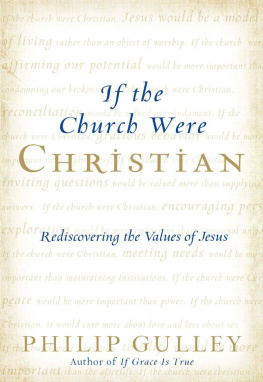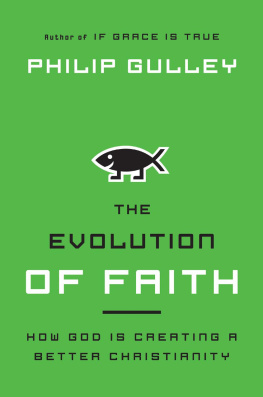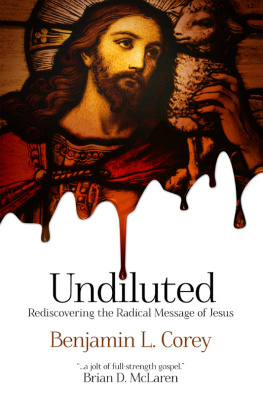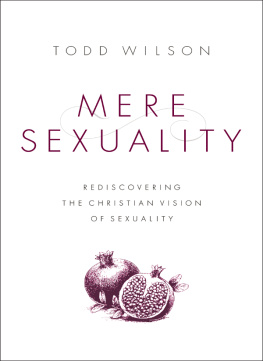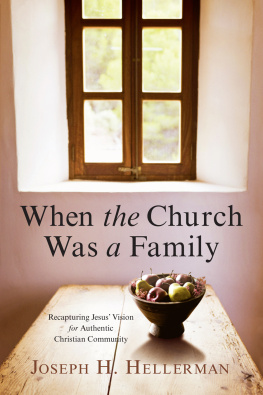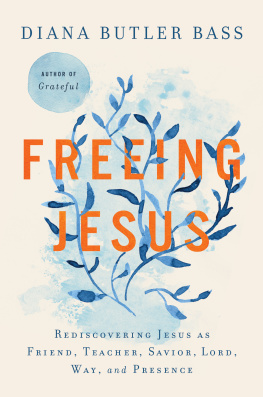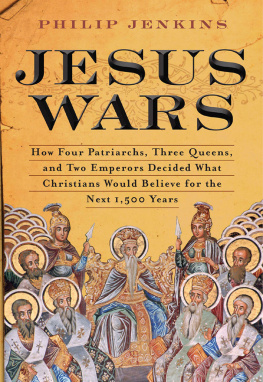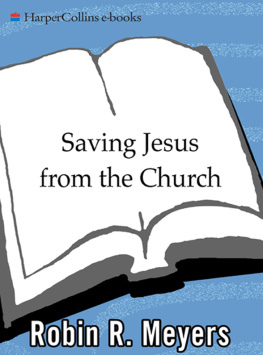Philip Gulley - If the Church Were Christian: Rediscovering the Values of Jesus
Here you can read online Philip Gulley - If the Church Were Christian: Rediscovering the Values of Jesus full text of the book (entire story) in english for free. Download pdf and epub, get meaning, cover and reviews about this ebook. year: 2011, publisher: HarperCollins, genre: Religion. Description of the work, (preface) as well as reviews are available. Best literature library LitArk.com created for fans of good reading and offers a wide selection of genres:
Romance novel
Science fiction
Adventure
Detective
Science
History
Home and family
Prose
Art
Politics
Computer
Non-fiction
Religion
Business
Children
Humor
Choose a favorite category and find really read worthwhile books. Enjoy immersion in the world of imagination, feel the emotions of the characters or learn something new for yourself, make an fascinating discovery.
- Book:If the Church Were Christian: Rediscovering the Values of Jesus
- Author:
- Publisher:HarperCollins
- Genre:
- Year:2011
- Rating:5 / 5
- Favourites:Add to favourites
- Your mark:
- 100
- 1
- 2
- 3
- 4
- 5
If the Church Were Christian: Rediscovering the Values of Jesus: summary, description and annotation
We offer to read an annotation, description, summary or preface (depends on what the author of the book "If the Church Were Christian: Rediscovering the Values of Jesus" wrote himself). If you haven't found the necessary information about the book — write in the comments, we will try to find it.
If the Church Were Christian: Rediscovering the Values of Jesus — read online for free the complete book (whole text) full work
Below is the text of the book, divided by pages. System saving the place of the last page read, allows you to conveniently read the book "If the Church Were Christian: Rediscovering the Values of Jesus" online for free, without having to search again every time where you left off. Put a bookmark, and you can go to the page where you finished reading at any time.
Font size:
Interval:
Bookmark:


If the Church Were Christian
Rediscovering the Values of Jesus
Philip Gulley

This book is dedicated to the memory of my maternal
grandmother, Norma Quinett, who first taught me
one could be both faithful and loving
If the Church Were Christian
My previous two theological booksIf Grace Is True and If God Is Lovewere written with Jim Mulholland, a fellow Quaker. Because of other commitments and shifting life priorities, Jim was unable to partner with me on this book. I felt his absence every day in the writing of this book. His keen mind and ability to reduce complex matters to an accessible form were blessings to me. I look forward to the day we can cowrite again.
In order to guard the anonymity of persons, I have often changed names, genders, and settings. As the occasional target of religious watchdogs, I am reluctant to reveal the names of persons whose sense of grace compelled them to operate outside the creeds and rules, lest they become targets too.
Most of these chapters had their genesis in messages I gave in a variety of churches, retreat centers, and colleges around the country, including my own faith community, Fairfield Friends Meeting, near Indianapolis. Everyone should be privileged to be in community with such fine people.
Every book Ive written was only possible because others worked alongside me. I am especially indebted to Steve Hanselman, Steve Green, Byron Williamson, and the good people of HarperOne who work so creatively on my behalfMark Tauber, Mickey Maudlin, Cynthia DiTiberio, Laina Adler, Julie Burton, Terri Leonard, Jim Warner, and Sam Barry.
My thanks to Stacey Denny, who makes me appear more organized than I am. She is a rare blend of grace and competence, and I am grateful for her assistance. If youve appreciated the GraceTalks Web site, PhilipGulley.org, you have Stacey Denny to thank.
I am also thankful for the churches, retreat centers, and colleges who endured the earliest forms of this book. Their thoughtful responses sharpened my thinking and elevated my spirit.
As always, I am indebted to my wife, Joan, and two sons, Spencer and Sam, who for many years have tolerated my theological forays with good humor.
If you wish to write me, please do so through my Web site, PhilipGulley.org. Unfortunately, I cant respond to every handwritten letter, especially those containing multiple Bible verses pointing out my theological inadequacies. I do make an effort to answer every e-mail, and that remains the best way to reach me.
One closing note: If, after reading this book, you have the impression I represent the Christianity I describe, you would be mistaken. Each of us has a dream; living up to the principles articulated in this book is mine.
When I was seven years old and preparing for my first communion, the teacher explained the illustrious history of our churchour miraculous beginnings, those seasons of peril when God intervened to preserve us, the heroic figures who led our church through the wilderness, the glorious conviction that our church alone had remained faithful to Jesuss vision. Naturally, I was grateful Id been born into the one true church.
While I was delighted at my good fortune, I worried about my fathers family, who generations before had allied themselves with an apostate movement. We were regularly encouraged to pray for those who belonged to lesser churches. Jesus spoke of such people, those who said Lord, Lord, but wouldnt enter the kingdom of heaven. He was talking, I was certain, about my relatives.
When I was a teenager, I was discussing religion with a friend who belonged to another denomination. I was surprised to discover that his church had the same vaunted history as mine. They, too, were uniquely chosen and blessed by God. They, too, traced their lineage to Jesus. They, too, were obedient to Gods Word. They, too, remained uniquely pure, untainted by the world. They, too, were prayingbut for me.
Initially, I found this unsettling. I wasnt sure which one of us was deceived. Given the nature of exclusive claims, one of us had to be wrong. My friends certainty seemed so complete, it caused me to doubt mine. I began to suspect Id been misled, and when he urged me to visit his church, I went. Within a year, Id joined his Quaker meeting, convinced Id discovered the real thing.
In my adult years, I began to wonder if the language of ecclesiastical purity, such as the One True Church and the Reformed Church, was based on a faulty assumptionthat we can actually know what Jesus intended the church to be. Whether our arguments for spiritual supremacy relied on an unbroken chain of apostolic succession, a literal reading of an inerrant Bible, or an insight gained in a moment of spiritual enlightenment, we all claimed to know the heart and mind of Jesus and his hope for the church, despite little evidence that Jesus even gave the church much thought. Most of what we assert about the church is based on fragmentary hints from Jesus and two thousand years of tradition.
Several years ago I visited a museum and saw the skeleton of a dinosaur. As I read the plaque, I learned only a handful of the bones were original, that the remainder had been fabricated based on a paleontologists extrapolation from the authentic bones. In many ways, this is similar to what the church has done. There are only two passages in one gospel (Matthew 16:18 and 18:17) where Jesus mentions the church, and even those references are dubious. Many scholars suspect the Matthean verses were not original to Jesus but were written back into the text by persons hoping to bolster their theological and ecclesial positions by placing them in the mouth of Jesus. From those two verses, we have built a vast institution based on these hints Jesus gave us. But we should never delude ourselves into thinking that todays church sprang directly from the mind and witness of Jesus. All we have is extrapolation, a few bones upon which have been erected a larger organism.
If Jesus intended to create the church, he did a questionable job. He left no clear directions about its structure or purpose. The apostle Paul and others would later do that, but Jesus didnt. Jesus did no fund-raising. In fact, he seemed unconcerned about financial development, telling his disciples to take no money for their ministry. If the disciples were his first board of directors, he chose poorly. In their first major decision, replacing Judas, they shunned standard business practices and drew lots.
Jesus did none of the things essential to forming a viable institution. Some may argue that Jesus wasnt negligent, that he was simply confident in the Holy Spirits ability to guide and grow the fledgling church. But Jesuss cautionary, even hostile, language about religious institutions makes such a claim doubtful, if not incredible. A fair reading of the earliest gospels offers scant evidence that Jesus intended to start a new religion.
Though a convincing argument could be made that Jesus didnt found the church, it seems unlikely that present-day Christians will disband their congregations. For many of us, its difficult to imagine a world without the church. Even if Jesus didnt intend to start the church, it will likely endure in one form or another. But if the church claims Jesus as its founder, it should at least share his values. The question for Christians is whether the church reflects the priorities of Jesus.
Font size:
Interval:
Bookmark:
Similar books «If the Church Were Christian: Rediscovering the Values of Jesus»
Look at similar books to If the Church Were Christian: Rediscovering the Values of Jesus. We have selected literature similar in name and meaning in the hope of providing readers with more options to find new, interesting, not yet read works.
Discussion, reviews of the book If the Church Were Christian: Rediscovering the Values of Jesus and just readers' own opinions. Leave your comments, write what you think about the work, its meaning or the main characters. Specify what exactly you liked and what you didn't like, and why you think so.

